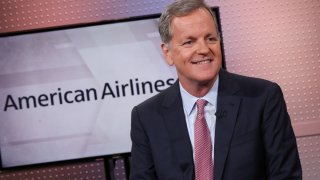
- Parker said Covid delayed his succession plans.
- He has been a CEO of a major airline for 20 years, bookended by the Sept. 11 attacks and the pandemic.
- Southwest's CEO, Gary Kelly, is also stepping down next year.
American Airlines CEO Doug Parker is stepping down next year after two decades running airlines and will be succeeded by the carrier's president, Robert Isom, on March 31, the company announced Tuesday.
Parker's retirement as CEO of the largest U.S. airline is the latest in a wave of leadership changes at the country's big carriers, and the new executives are tasked with driving their recovery from the Covid pandemic.
Get Tri-state area news and weather forecasts to your inbox. Sign up for NBC New York newsletters.
Southwest Airlines CEO Gary Kelly will step down in February, handing the reins to another longtime executive, Bob Jordan, in February. Scott Kirby, who was fired as president of American in 2016, jumped to United Airlines and became that carrier's CEO in May 2020. Isom, who took Kirby's job in 2016, has been Parker's heir apparent since then.
Parker, 60, will continue as chairman of American's board.
"It likely would have happened sooner, but the global pandemic — and the devastating impact it had on our industry — delayed those plans," Parker said in a note to staff Tuesday.
Money Report
From 9/11 to Covid
Parker's career as an airline CEO spans 20 years, bookended by two crises: 9/11 and the Covid pandemic. In the latter, Parker helped win $54 billion in federal aid to cover payroll expenses, with thousands of jobs at risk during the depths of the pandemic.
"No other CEO worked as hard, spent as much time with Congress or the administration, or felt the urgency of keeping people connected to our jobs — not once, but three times," wrote Sara Nelson, president of the Association of Flight Attendants, the largest union of cabin crew members, who pushed for the aid package, working closely with airline CEOs, including Parker. "The industry is standing today and able to lift us out of the biggest crisis in aviation history."
Parker became CEO of America West 10 days before the Sept. 11, 2001 attacks. In the wake of the attacks, while many carriers struggled to rebound, Parker saw the challenging environment as the right opportunity for consolidation.
He oversaw two mergers — with US Airways and in 2013 with American Airlines, at the tail end of a wave of consolidation among U.S. carriers that propelled American to become the largest U.S. airline. He was CEO of the combined America West and US Airways years earlier.
Following the Great Recession that ended in 2009, airlines were saddled with massive debt and high legacy costs, spurring a series of bankruptcies and another round of mergers. Once again, Parker saw a rare opportunity to create a larger airline with the size and scale he could never achieve at US Airways.
This time, the target was American which had tumbled into bankruptcy in 2011. Parker engineered a merger between US Airways and American, creating the largest airline in the world when American emerged from Chapter 11 bankruptcy in 2013. Once again Parker was CEO while Isom oversaw the integration of the two carriers as chief operating officer.
Parker and Isom together oversaw expansion of international and domestic partnerships, including with Alaska Airlines and JetBlue Airways. The latter sparked a lawsuit this year from the Justice Department, which alleges it will lead to higher airfares and poorer customer service. The airlines have denied the allegations.
Parker and Isom also introduced new fare classes like no-frills basic economy and fees advanced selection of many seats, trends that have played out among large airlines, as well as a massive overhaul of their narrow-body planes to fit more seats on board.
The Covid pandemic snapped a decadelong streak of U.S. airline industry profits, which were boosted by cheap oil and strong growth in travel demand, making even crisis-seasoned Parker overly optimistic.
"I don't think we're ever going to lose money again," Parker said on the company's investor day in September 2017. Parker lost a bet for a bottle of wine with a UBS analyst that the airline's shares would hit $60 before the analyst's birthday in 2018. Shares of American peaked in January 2018 at $58.47. American's shares are down about 70% from then, ending 0.2% lower on Tuesday at $17.89, a smaller daily decline than other carriers.
Labor and losses
Isom, 58, who has a some three-decade career in aviation, will become CEO of an airline that is still losing money as it tries to rebuild a business that collapsed during the pandemic.
"Our goal is to make American the best airline in the business," Isom said in an interview on Tuesday. "In 2022, it's all about providing as reliable a product as we can as customers come back and returning American to profitability as soon as possible."
In the first three quarters of 2021, American has lost almost $4.8 billion after losing $9.5 billion last year when Covid forced countries around the world to implement travel restrictions and potential customers avoided taking flights. American went into the pandemic with more debt than rivals and added to its pile to get through the crisis.
Airline analysts were quick to point out Isom's operations experience and his ability to provide continuity as the carrier digs its way out of the pandemic.
"The Board's decision to stick to an internal candidate reflects the confidence the Board has in the strategy of the airline," wrote Jefferies airline analyst Sheila Kahyaoglu on Tuesday.
Helane Becker, airline analyst at Cowen, said Isom's operations experience "suggests to us a focus on improving on-time performance and other aspects of the operations."
American has been more aggressive in restoring flying during the pandemic compared with close competitors like Delta Air Lines and United, now helmed by ousted American alumnus Kirby.
That has tripped the airline up at times, such as the some 2,000 flights it canceled around Halloween as high winds paused operations at its biggest hub at Dallas/Fort Worth International Airport, and it was left struggling with staffing shortages.
"There's been hiccups and growth issues we've had to deal with but we're positioned really well," Isom said. "We're going to make sure that we have an airline that's ready to go when customers want to travel. The right number of people, the right number of aircraft."
In addition to hiring hundreds of new employees in a tight labor market, Isom and his team will be negotiating labor contracts with unions representing pilots, flight attendants and other work groups.
United's Kirby, in a response to an American Airlines Instagram post announcing the CEO transition, congratulated Parker for his more than two-decade run at the helm and thanked him for his friendship and mentorship.
He also congratulated Isom.
"I'm happy for him, but it's game on!" he wrote.






